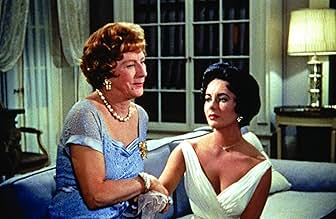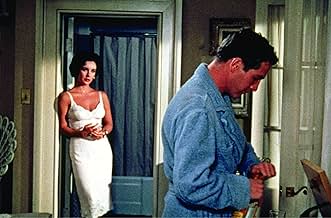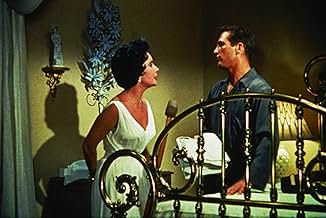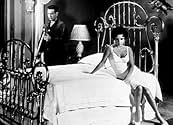IMDb RATING
7.9/10
56K
YOUR RATING
Brick is an alcoholic ex-football player who drinks his days away and resists the affections of his wife. A reunion with his terminally ill father jogs a host of memories and revelations for... Read allBrick is an alcoholic ex-football player who drinks his days away and resists the affections of his wife. A reunion with his terminally ill father jogs a host of memories and revelations for both father and son.Brick is an alcoholic ex-football player who drinks his days away and resists the affections of his wife. A reunion with his terminally ill father jogs a host of memories and revelations for both father and son.
- Director
- Writers
- Stars
- Nominated for 6 Oscars
- 3 wins & 16 nominations total
Zelda Cleaver
- Sookey
- (uncredited)
Brian Corcoran
- Boy
- (uncredited)
Hugh Corcoran
- Buster
- (uncredited)
Kevin Corcoran
- Child
- (uncredited)
Patty Ann Gerrity
- Dixie
- (uncredited)
Bobby Johnson
- Pollitt Groom
- (uncredited)
Walter Merrill
- Party Guest
- (uncredited)
Deborah Miller
- Trixie
- (uncredited)
Robert 'Rusty' Stevens
- Sonny
- (uncredited)
Vince Townsend Jr.
- Lacey
- (uncredited)
- Director
- Writers
- All cast & crew
- Production, box office & more at IMDbPro
Featured reviews
This is a fantastic look into a dysfunctional American family, 1950's Style. I was prepared to hate this movie, as I typically don't get into dramas at all. Fortunately, I was completely drawn in. Paul Newman's character (Brick) is enigmatic at best, but somehow, because Maggie the Cat loves him so much and is so utterly devoted to him, you find yourself caring about what happens to him and Maggie both.
Big Daddy and Big Mama both bring back fond memories of my own childhood, and if you grew up in the south, chances are you knew someone like the both of them. Their characters are written and performed so typically Southern, that I realized half way through I felt family connections with the whole family, including the no-neck monsters! Sister Girl is the sister in law from Hades, and her husband needs to dig into her purse for his...manhood. We ALL know a couple like that!
All in all? Elizabeth Taylor, Paul Newman, and Burl Ives are breathtakingly beautiful in their portrayals. This is probably not a good family movie, as Brick has a serious drinking problem and Maggie IS so desperate for his affections, and probably not a good Friday/Saturday night movie, but I still love it, and will think of it fondly for the rest of my life.
It rates an 8.8/10 from...
the Fiend :.
Big Daddy and Big Mama both bring back fond memories of my own childhood, and if you grew up in the south, chances are you knew someone like the both of them. Their characters are written and performed so typically Southern, that I realized half way through I felt family connections with the whole family, including the no-neck monsters! Sister Girl is the sister in law from Hades, and her husband needs to dig into her purse for his...manhood. We ALL know a couple like that!
All in all? Elizabeth Taylor, Paul Newman, and Burl Ives are breathtakingly beautiful in their portrayals. This is probably not a good family movie, as Brick has a serious drinking problem and Maggie IS so desperate for his affections, and probably not a good Friday/Saturday night movie, but I still love it, and will think of it fondly for the rest of my life.
It rates an 8.8/10 from...
the Fiend :.
Much has been made of the differences between Tennessee Williams' play and this film--the homoerotic themes have been driven further into subtext (though not eliminated entirely) and a more upbeat ending was added. The changes were necessary when the film was made; although theater and literary purists decry the "sanitizing" or censorship of plays when they are adapted for the screen, in some cases (such as this one) the changes can improve the work in question. "Cat" on film is clearer, for one thing. Tennessee Williams plays tend to be "cluttered" in their original form. They are also cynically downbeat; if that type of story appeals to one, this adaptation might be off-putting.
As with all theatrical adaptations, many of the scenes are excessively talky, especially the Brick/Big Daddy scenes in the second act. Some of the highlights are just as wordy but thoroughly enjoyable rather than tedious (especially Maggie's story about Mae's reign as Cotton Carnival Queen and the entire scene in the basement). All of the performances are excellent, though Paul Newman as Brick is less flashy; it's not really until the basement scene that one feels his talent is given a workout. Elizabeth Taylor is an emotional rollercoaster, venturing from flirtatious to hectoring to wheedling to calm to grasping to tender, often within a single scene, and yet she never slips the rails. Watching films from this period (her career peak), one wonders what happened to turn her into the vague, bleary-eyed woman we see today. Judith Anderson's Big Mama is loud, coarse, and bossy, but completely sympathetic both in the scene with the birthday cake and in the confrontation scene at the end. When Big Daddy invites her along with him at the end, it is every bit as welcome to the viewer as it is to her. Burl Ives is the most towering of all; the emotional growth in the film is as much his as it is Brick's. Jack Carson and Madeleine Sherwood are every bit as good despite being relegated to comic relief at times.
My favorite aspect of this story, however, is the social dynamic. Brick and Maggie are spoiled, young, "beautiful people" who have yet to take on any responsibility, while Gooper and Mae are the epitome of a serious young family. Brick is an alcoholic former football player, while Gooper is a corporate lawyer. Despite these obvious differences, however, both their parents and the audience (and Tennessee Williams, obviously) clearly prefer Brick and Maggie. Every aspect of Gooper and Mae's personalities, even those which bespeak traditional values, are portrayed as petty and unimaginative. Even if one believes that Gooper and Mae have done all the right things, they have done them for the wrong reasons. Thus the theme of the story is most clearly presented: all that is important is to love and to express that love.
As with all theatrical adaptations, many of the scenes are excessively talky, especially the Brick/Big Daddy scenes in the second act. Some of the highlights are just as wordy but thoroughly enjoyable rather than tedious (especially Maggie's story about Mae's reign as Cotton Carnival Queen and the entire scene in the basement). All of the performances are excellent, though Paul Newman as Brick is less flashy; it's not really until the basement scene that one feels his talent is given a workout. Elizabeth Taylor is an emotional rollercoaster, venturing from flirtatious to hectoring to wheedling to calm to grasping to tender, often within a single scene, and yet she never slips the rails. Watching films from this period (her career peak), one wonders what happened to turn her into the vague, bleary-eyed woman we see today. Judith Anderson's Big Mama is loud, coarse, and bossy, but completely sympathetic both in the scene with the birthday cake and in the confrontation scene at the end. When Big Daddy invites her along with him at the end, it is every bit as welcome to the viewer as it is to her. Burl Ives is the most towering of all; the emotional growth in the film is as much his as it is Brick's. Jack Carson and Madeleine Sherwood are every bit as good despite being relegated to comic relief at times.
My favorite aspect of this story, however, is the social dynamic. Brick and Maggie are spoiled, young, "beautiful people" who have yet to take on any responsibility, while Gooper and Mae are the epitome of a serious young family. Brick is an alcoholic former football player, while Gooper is a corporate lawyer. Despite these obvious differences, however, both their parents and the audience (and Tennessee Williams, obviously) clearly prefer Brick and Maggie. Every aspect of Gooper and Mae's personalities, even those which bespeak traditional values, are portrayed as petty and unimaginative. Even if one believes that Gooper and Mae have done all the right things, they have done them for the wrong reasons. Thus the theme of the story is most clearly presented: all that is important is to love and to express that love.
I first encountered "Cat" in a fine National Theatre production in 1988 with Lindsay Duncan as Maggie, Ian Charleson as Brick, Eric Porter as Big Daddy, Paul Jessons as Gooper and Alison Steadman as Mae.
The film is not the play, but you don't often get an opportunity to see a fine cast perform this amazing play, and it needs a fine cast.
The movie has a fine cast. The movie grips you from start to finish. The movie even adds a little; the basement scene works wonderfully in the movie in ways that would be hard or impossible to reproduce on stage.
Yes, the play has been bowdlerised to make it into a movie, but what do you expect in 1958. The reality is, this film is a piece of cinema and drama history. You'd need to be a "Williams Fundamentalist" to hate the movie for its toned-down-ness. To the balanced Williams fan, it is gripping, well acted and nicely-paced.
Once every 10-15 years there is a truly fine production of this play in a world-class theatre. If you get the chance, go see a great production in the theatre. In between times, this movie is a very good second.
The film is not the play, but you don't often get an opportunity to see a fine cast perform this amazing play, and it needs a fine cast.
The movie has a fine cast. The movie grips you from start to finish. The movie even adds a little; the basement scene works wonderfully in the movie in ways that would be hard or impossible to reproduce on stage.
Yes, the play has been bowdlerised to make it into a movie, but what do you expect in 1958. The reality is, this film is a piece of cinema and drama history. You'd need to be a "Williams Fundamentalist" to hate the movie for its toned-down-ness. To the balanced Williams fan, it is gripping, well acted and nicely-paced.
Once every 10-15 years there is a truly fine production of this play in a world-class theatre. If you get the chance, go see a great production in the theatre. In between times, this movie is a very good second.
There are tensions that have built between a couple, Brick Pollitt shows contempt, it's far from subtle, his wife Maggie's in despair, she's in love and really cares, but it's fair to say this pairing, is in trouble. Big Daddy joins the party for his birthday, but the whiskey being drunk just goes down one way, secrets hidden and withheld, relationships are hewn and felled, wounds reopened, from a friend, lost through betray. At the climax of this film you'll hold your breath, as the family is overwhelmed, distressed, with performances profound, so much lost and so much found, you will not be disappointed, I attest.
Three of the greatest cinematic performances placed on film.
Three of the greatest cinematic performances placed on film.
The best thing Cat on a Hot Tin Roof has going for it is one truly remarkable acting performance. And that performance comes from neither Elizabeth Taylor nor Paul Newman. There's nothing wrong with the work turned in by Taylor and Newman, they are both perfectly fine in their roles. And it is their characters who are the focus for most of the film. But late on in the proceedings Burl Ives grabs hold of the film and makes it his own. Ives turns in a performance which is so strong and powerful that it threatens to overshadow and overwhelm everything else in the film. However it is rather difficult to overshadow Elizabeth Taylor and Paul Newman. And the film's rather simple story is certainly compelling enough so as not to be overwhelmed by the Ives tour de force near the end. So while Ives may end up being the most memorable thing the film has to offer he is certainly not the only memorable thing. His great performance is merely the best part of what is an overall thoroughly satisfying film.
The film's simple story centers around a day in the life of a wealthy Southern family. With this family the key word is "mendacity". What does that even mean? Any of our characters who initially don't know about mendacity surely will by the time the story plays itself out. As we meet them everyone has come together to celebrate the 65th birthday of family patriarch Big Daddy. Initially it seems the film is about Big Daddy's son Brick and his wife Maggie the Cat. Brick and Maggie are not currently in the throes of wedded bliss. To say their relationship is strained would be putting it mildly. The fact that alcohol seems to be the only thing in life Brick is at all interested in probably does not help matters. But as the film progresses we see there is a larger issue than Brick and Maggie's troubled marriage. Big Daddy is dying. And nobody, not his family and not his doctors, has the guts to tell him. This will ultimately play itself out in powerful, heartrending fashion.
For much of the film's running time you would call it compelling but certainly not spectacular. But then Ives, as Big Daddy, grabs the film by its throat and shakes some real life into it. There's a scene where Ives as Big Daddy and Newman as Brick are alone in a basement which simply could not have been performed any better. There's so much these characters have to say to one another. The emotion is raw and the scene is so powerful. It hits you right in the heart. Just this one scene alone, with these two great actors, elevates the film all by itself. Newman is terrific. Ives is astounding. Perhaps it is in fact possible to overshadow Elizabeth Taylor. Maybe just this once. Maggie the Cat is an intriguing character in her own right and Taylor certainly doesn't disappoint in the role. But it turns out that ultimately the film is really about the relationship between Brick and his father, not Brick and his wife. And as such it is Newman, and most especially Ives, who you will most remember. It is their work which transforms a good movie into something truly memorable.
The film's simple story centers around a day in the life of a wealthy Southern family. With this family the key word is "mendacity". What does that even mean? Any of our characters who initially don't know about mendacity surely will by the time the story plays itself out. As we meet them everyone has come together to celebrate the 65th birthday of family patriarch Big Daddy. Initially it seems the film is about Big Daddy's son Brick and his wife Maggie the Cat. Brick and Maggie are not currently in the throes of wedded bliss. To say their relationship is strained would be putting it mildly. The fact that alcohol seems to be the only thing in life Brick is at all interested in probably does not help matters. But as the film progresses we see there is a larger issue than Brick and Maggie's troubled marriage. Big Daddy is dying. And nobody, not his family and not his doctors, has the guts to tell him. This will ultimately play itself out in powerful, heartrending fashion.
For much of the film's running time you would call it compelling but certainly not spectacular. But then Ives, as Big Daddy, grabs the film by its throat and shakes some real life into it. There's a scene where Ives as Big Daddy and Newman as Brick are alone in a basement which simply could not have been performed any better. There's so much these characters have to say to one another. The emotion is raw and the scene is so powerful. It hits you right in the heart. Just this one scene alone, with these two great actors, elevates the film all by itself. Newman is terrific. Ives is astounding. Perhaps it is in fact possible to overshadow Elizabeth Taylor. Maybe just this once. Maggie the Cat is an intriguing character in her own right and Taylor certainly doesn't disappoint in the role. But it turns out that ultimately the film is really about the relationship between Brick and his father, not Brick and his wife. And as such it is Newman, and most especially Ives, who you will most remember. It is their work which transforms a good movie into something truly memorable.
Did you know
- TriviaDespite being really affected by her husband Mike Todd's death, Elizabeth Taylor resumed her job in a very professional way, without any delay on the set. Everyone was astonished by her determination.
- GoofsAfter Brick tries to drive away and gets stuck, Maggie goes out to him and helps him into the house through the pouring rain. Her hair is soaking wet, but the next time she is seen, it's perfectly dry and styled.
- Quotes
Harvey 'Big Daddy' Pollitt: I've got the guts to die. What I want to know is, have you got the guts to live?
- ConnectionsEdited into Hollywood: The Dream Factory (1972)
Details
- Release date
- Country of origin
- Language
- Also known as
- Un gato sobre el tejado caliente
- Filming locations
- Metro-Goldwyn-Mayer Studios - 10202 W. Washington Blvd., Culver City, California, USA(studio: made in Hollywood, U.S.A. by)
- Production company
- See more company credits at IMDbPro
Box office
- Budget
- $3,000,000 (estimated)
- Gross worldwide
- $1,872
- Runtime
- 1h 48m(108 min)
- Color
- Aspect ratio
- 1.85 : 1
Contribute to this page
Suggest an edit or add missing content


































